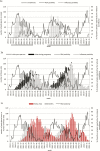Burden of Respiratory Syncytial Virus Infection in South African Human Immunodeficiency Virus (HIV)-Infected and HIV-Uninfected Pregnant and Postpartum Women: A Longitudinal Cohort Study
- PMID: 29253090
- PMCID: PMC5961360
- DOI: 10.1093/cid/cix1088
Burden of Respiratory Syncytial Virus Infection in South African Human Immunodeficiency Virus (HIV)-Infected and HIV-Uninfected Pregnant and Postpartum Women: A Longitudinal Cohort Study
Abstract
Background: Limited data exist on the burden of respiratory syncytial virus (RSV) illness among pregnant women, to determine their potential benefit from RSV vaccination. We evaluated the incidence of RSV illness from midpregnancy until 24 weeks postpartum in human immunodeficiency virus (HIV)-uninfected and HIV-infected women and their infants.
Methods: Mother-infant dyads were enrolled in maternal influenza vaccine efficacy trials. These included 1060 and 1056 HIV-uninfected pregnant women in 2011 and 2012, respectively, 194 HIV-infected pregnant women in 2011, and their infants. Upper respiratory tract samples obtained at illness visits were tested for RSV.
Results: The incidence (per 1000 person-months) of RSV illness (n = 43 overall) among HIV-uninfected women was lower in 2011 (1.2; 95% confidence interval [CI], .6-2.2) than in 2012 (4.0; 95% CI, 2.8-5.6). The incidence of RSV illness (n = 5) in HIV-infected women was 3.4 (95% CI, 1.4-8.1). Maternal RSV infection was associated with respiratory symptoms including cough (72.1%), rhinorrhea (39.5%), sore throat (37.2%), and headache (42%), but fever was absent. RSV infection during pregnancy was not associated with adverse pregnancy outcomes. Postpartum, RSV infection in mothers (n = 27) was associated with concurrent infection among 51.9% of their infants and, conversely, 29.8% of mothers investigated within 7 days of their infants having an RSV illness also tested positive for RSV.
Conclusions: RSV infection is associated with respiratory illness during pregnancy and postpartum. Vaccination of pregnant women against RSV could benefit the mother, albeit primarily against nonfebrile illness, and her infant.
Clinical trial registration: NCT01306669 and NCT01306682.
Figures

Comment in
-
Respiratory Syncytial Virus During Pregnancy.Clin Infect Dis. 2018 May 17;66(11):1666-1667. doi: 10.1093/cid/cix1091. Clin Infect Dis. 2018. PMID: 29253107 Free PMC article. No abstract available.
Similar articles
-
The Impact of Maternal Human Immunodeficiency Virus Infection on the Burden of Respiratory Syncytial Virus Among Pregnant Women and Their Infants, Western Kenya.J Infect Dis. 2022 Jun 15;225(12):2097-2105. doi: 10.1093/infdis/jiaa490. J Infect Dis. 2022. PMID: 32777041 Free PMC article.
-
Bordetella pertussis Infection in South African HIV-Infected and HIV-Uninfected Mother-Infant Dyads: A Longitudinal Cohort Study.Clin Infect Dis. 2016 Dec 1;63(suppl 4):S174-S180. doi: 10.1093/cid/ciw527. Clin Infect Dis. 2016. PMID: 27838670 Free PMC article.
-
Epidemiology of respiratory syncytial virus-associated acute lower respiratory tract infection hospitalizations among HIV-infected and HIV-uninfected South African children, 2010-2011.J Infect Dis. 2013 Dec 15;208 Suppl 3:S217-26. doi: 10.1093/infdis/jit479. J Infect Dis. 2013. PMID: 24265481
-
Respiratory syncytial virus in infants: is maternal vaccination a realistic strategy?Curr Opin Infect Dis. 2015 Jun;28(3):221-4. doi: 10.1097/QCO.0000000000000161. Curr Opin Infect Dis. 2015. PMID: 25918956 Review.
-
Antiretroviral therapy (ART) for treating HIV infection in ART-eligible pregnant women.Cochrane Database Syst Rev. 2010 Mar 17;(3):CD008440. doi: 10.1002/14651858.CD008440. Cochrane Database Syst Rev. 2010. PMID: 20238370 Review.
Cited by
-
The journey to a respiratory syncytial virus vaccine.Ann Allergy Asthma Immunol. 2020 Jul;125(1):36-46. doi: 10.1016/j.anai.2020.03.017. Epub 2020 Mar 23. Ann Allergy Asthma Immunol. 2020. PMID: 32217187 Free PMC article. Review.
-
Placental Transfer of Respiratory Syncytial Virus Antibody Among HIV-Exposed, Uninfected Infants.J Pediatric Infect Dis Soc. 2020 Jul 13;9(3):349-356. doi: 10.1093/jpids/piz056. J Pediatric Infect Dis Soc. 2020. PMID: 31549157 Free PMC article.
-
Transplacental Antibody Transfer of Respiratory Syncytial Virus Specific IgG in Non-Human Primate Mother-Infant Pairs.Pathogens. 2021 Nov 5;10(11):1441. doi: 10.3390/pathogens10111441. Pathogens. 2021. PMID: 34832599 Free PMC article.
-
Biological factors that may impair transplacental transfer of RSV antibodies: Implications for maternal immunization policy and research priorities for low- and middle-income countries.Vaccine. 2022 Jul 30;40(32):4361-4370. doi: 10.1016/j.vaccine.2022.06.034. Epub 2022 Jun 17. Vaccine. 2022. PMID: 35725783 Free PMC article. Review.
-
Characteristics and Outcomes of Pregnant Women Hospitalized With Laboratory-Confirmed Respiratory Syncytial Virus Before and During the COVID-19 Pandemic.Open Forum Infect Dis. 2024 Jan 31;11(3):ofae042. doi: 10.1093/ofid/ofae042. eCollection 2024 Mar. Open Forum Infect Dis. 2024. PMID: 38524226 Free PMC article.
References
-
- Stensballe LG, Ravn H, Kristensen K, Meakins T, Aaby P, Simoes EA. Seasonal variation of maternally derived respiratory syncytial virus antibodies and association with infant hospitalizations for respiratory syncytial virus. J Pediatr 2009; 154:296–8. - PubMed
-
- Roca A, Abacassamo F, Loscertales MP, et al. . Prevalence of respiratory syncytial virus IgG antibodies in infants living in a rural area of Mozambique. J Med Virol 2002; 67:616–23. - PubMed
-
- Palivizumab, a humanized respiratory syncytial virus monoclonal antibody, reduces hospitalization from respiratory syncytial virus infection in high-risk infants. Pediatrics 1998; 102:531–7. - PubMed
-
- Glenn GM, Fries LF, Thomas DN, et al. . A randomized, blinded, controlled, dose-ranging study of a respiratory syncytial virus recombinant fusion (F) nanoparticle vaccine in healthy women of childbearing age. J Infect Dis 2016; 213:411–22. - PubMed
Publication types
MeSH terms
Associated data
LinkOut - more resources
Full Text Sources
Other Literature Sources
Medical

